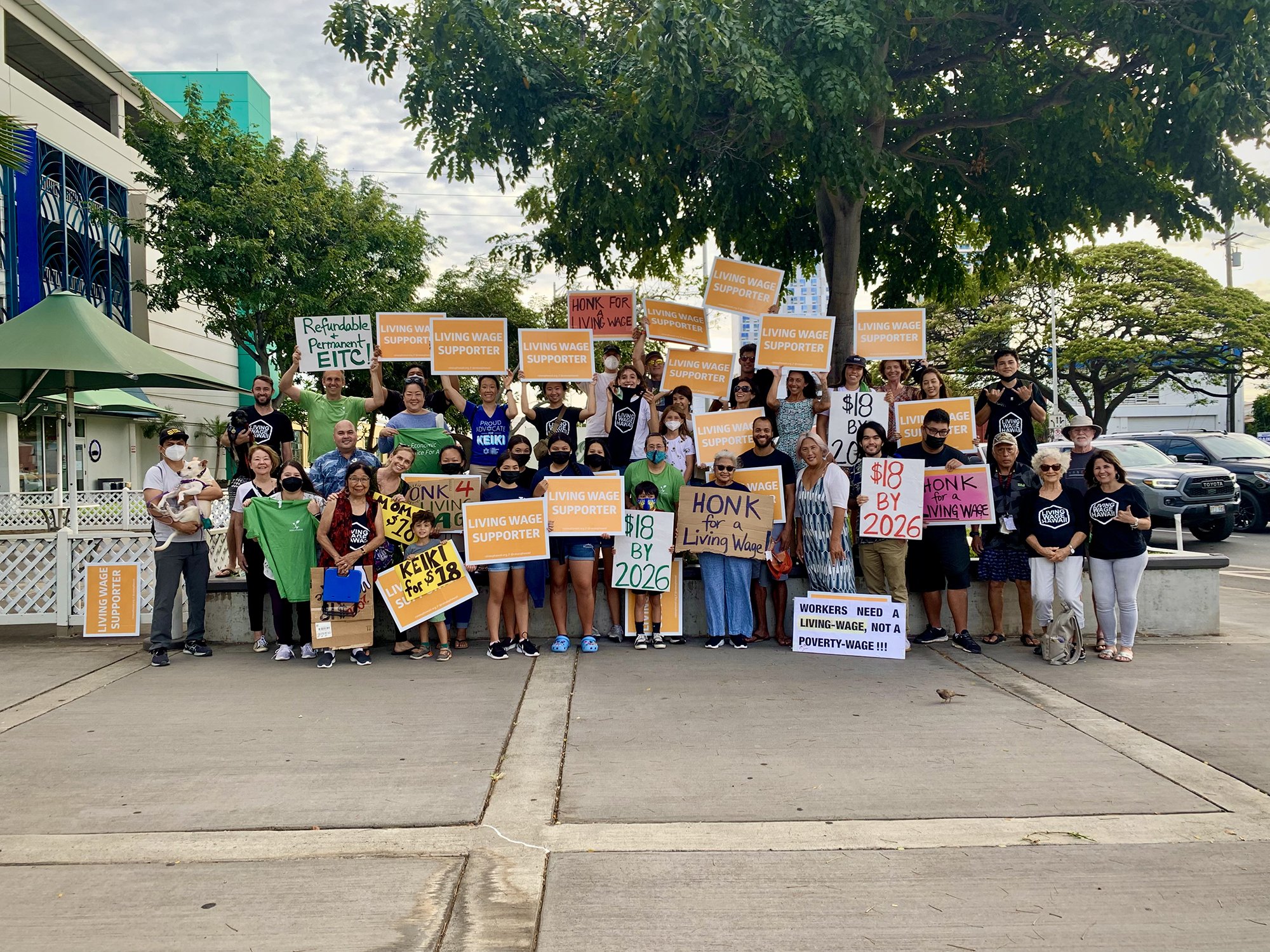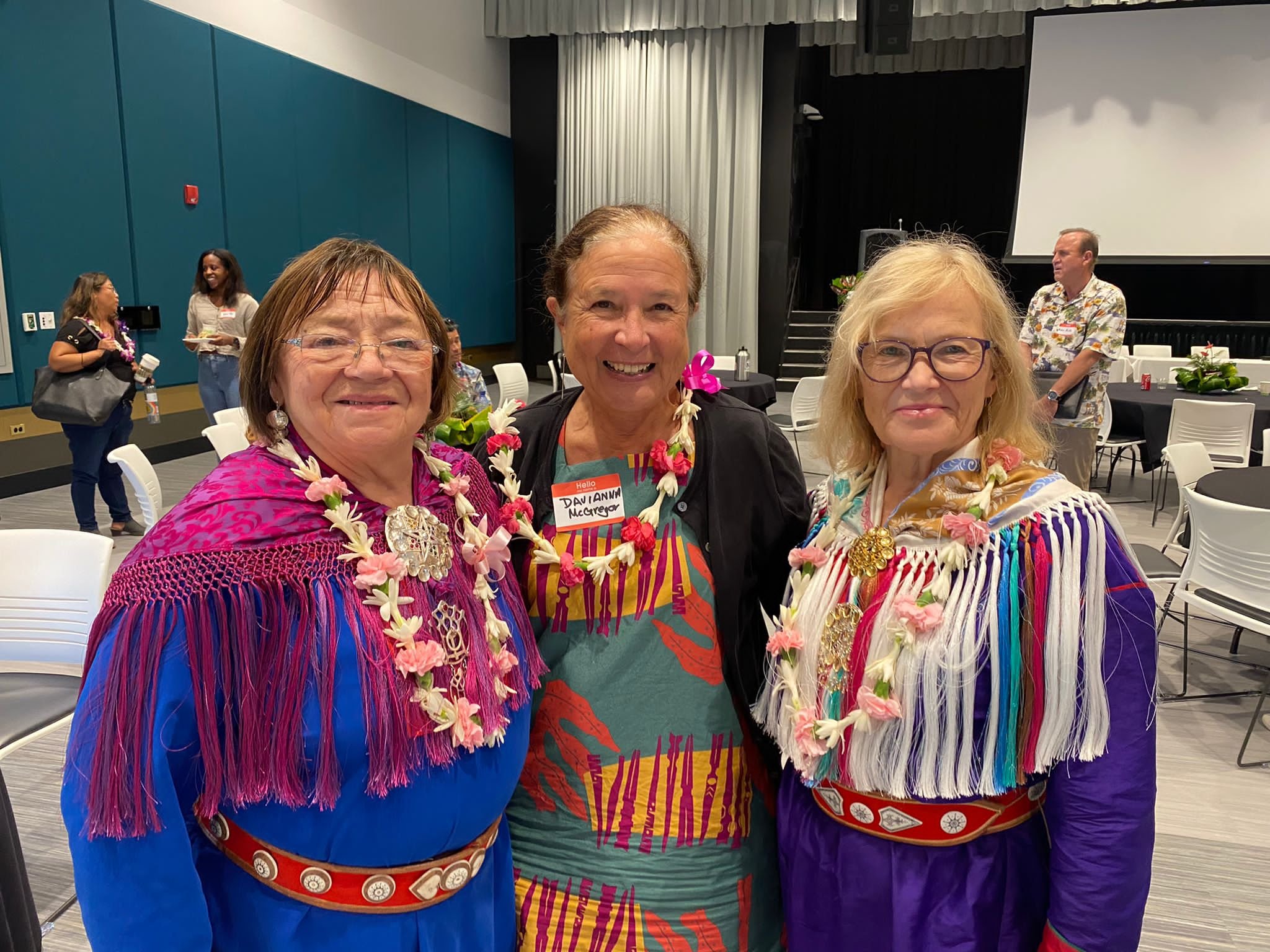
20 Years of Hawaiʻi Appleseed
For two decades, Hawaiʻi Appleseed has advocated for a Hawaiʻi that puts its people first—a Hawaiʻi where everyone can meet their basic needs while living happy, healthy and creative lives. This is our story.
Your support fuels our fight for justice.
Help us reach our $100,000 fundraising goal by the end of 2024.
To donate by check, please make payable to Hawaiʻi Appleseed and send to 733 Bishop Street, Suite 1180, Honolulu, HI 96813.
Founding and Early Years (2004–2010)
2004: Establishment as Lawyers for Equal Justice
The Hawaiʻi Appleseed Center for Law & Economic Justice was founded in 2004 under the name Lawyers for Equal Justice. The organization was created by a group of dedicated attorneys and advocates who were deeply concerned about the persistent issues of poverty and inequality in Hawaiʻi. Their mission was to use legal tools to address systemic issues and ensure that low-income and marginalized communities had access to justice.
Hawaiʻi Appleseed’s outgoing Executive Director, Gavin Thornton, was also its first employee. // Will Caron, 2019 Artists for Appleseed fundraiser
Focus Areas and Initial Campaigns
In its early years, Lawyers for Equal Justice was led by veteran civil rights attorney Victor Geminiani and concentrated on housing rights, public benefits, and economic security. The organization quickly became known for its impactful litigation, policy advocacy, and community education efforts. Early campaigns included fighting for the rights of public housing residents and advocating for fair access to public benefits.
LEJ’s first case, brought in 2004, was aimed at stopping the state from overcharging low-income families, and ensuring that subsidized housing serves its purpose as a platform for economic stability. This case brought on the hiring of LEJ’s first employee, a part-time attorney named Gavin Thornton, who many years later would go on to lead the organization as its executive director. The case resulted in rent reductions amounting to over $1 million every year since the case was resolved.
Additional LEJ legal victories forced the state to:
Ensure that homeless children in Hawaiʻi have full, meaningful access to a public education (2007–08);
Make long-overdue upgrades to the Kuhio Park Terrace and Mayor Wright Homes public housing developments that had fallen into extreme disrepair and squalor (2008–15);
Preserve the right to access critical, life-saving healthcare for Compact of Free Association (COFA) residents (2010–2014), and
Process and deliver Supplemental Nutrition Assistance Program (SNAP) benefits in a timely way to beneficiaries (2010–2011).
Expansion and Renaming (2011–2016)
Becoming the Hawaiʻi Appleseed Center for Law & Economic Justice
In 2011, the organization became the Hawaiʻi Appleseed Center for Law & Economic Justice. This change reflected a broader mission to tackle economic injustice, aligning with the work of a national network of Appleseed Centers dedicated to pursuing social and economic equality through research, organizing, policy advocacy, and impact litigation. The shift in focus to policy advocacy—which would take time and develop gradually over this period—recognized that enforcing existing laws wasn’t enough to achieve equity within a legal and policy framework that is inherently inequitable.
Hawaiʻi Appleseed clients in the foster care case. // Hawaiʻi Appleseed
While the organization began conducting data-driven research and advocacy on housing, taxation and other economic justice issues, it continued to file class action lawsuits against the state. In 2013, Appleseed sued to force the state to increase foster care payments to account for the rising cost of living. In 2017, the legislature took action to increase the foster care rates, rendering the lawsuit moot and cementing the proof of concept for winning systemic victories through the legislative branch rather than (or in addition to) the judicial branch. An additional lawsuit forced the state to provide language translation on driver’s license forms and tests (2013–2015).
Broadening Impact and Advocacy (2017–2022)
With its new focus solidified, Hawaiʻi Appleseed expanded its research and advocacy to address poverty and the cost of living—particularly the extreme cost of housing in Hawaiʻi—through evidence-based solutions such as minimum wage increases, tax credits and other government supports. The organization played a crucial role in campaigns to increase Hawaiʻi’s minimum wage and advocated for the Earned Income Tax Credit to support working families.
In 2018, the organization joined the State Priorities Partnership, a network of policy think tanks convened by the Center on Budget and Policy Priorities, and created a budget-focused initiative called the Hawaiʻi Budget & Policy Center, headed by veteran policy expert Beth Giesting, to heavily invest in budget-focused data and research to inform the policy advocacy of Hawaiʻi Appleseed.
Notable Achievements
Hawaiʻi Appleseed staff, supporters and coalition partners sign-wave in support of raising the state minimum wage and expanding the Earned Income Tax Credit in 2022, efforts that paid off after multiple years of advocacy. // Will Caron
During this period, Hawaiʻi Appleseed’s research and policy reports became essential resources for lawmakers and community activists, and Appleseed’s reputation as the go-to policy think tank for economic justice was established. Hawaiʻi Appleseed deployed data-driven research products and coalition-based legislative advocacy to successfully secure passage of legislation that:
Established the State of Hawaiʻi’s Earned Income Tax Credit (EITC) program, delivering $20 million dollars in tax relief each year to the working families of the state (2017);
Established DA BUX, a program for SNAP beneficiaries, which has dramatically expanded the capacity of low-income households to eat more healthy, locally-sourced food. DA BUX has become one of the most popular government programs in the state (2019);
Increased Hawaiʻi’s minimum wage, providing for a transition from $10.10 to $18 an hour over 6 years, delivering $1 billion in additional wages each year to the state’s more than 200,000 low-wage workers that continues to translate into economic growth and prosperity for the entire community (2022); and
Expanded the state EITC to maximize its benefits and better-target them toward the truly low-income families that need the help the most, increasing the credit’s total value to $40 million each year (2022).
Addressing Homelessness and Housing Crisis
As the housing crisis in Hawaiʻi deepened during this period, Hawaiʻi Appleseed began to devote increasingly significant resources on addressing homelessness and the lack of affordable housing. Initially, this included efforts such as advocating for the expansion of Accessory Dwelling Unit options, as well as a deep dive of research into the impact of short-term vacation rentals on the supply of long-term housing for locals—work that contributed to the creation of a string of county ordinances aimed at curbing the proliferation of illegal short-term rentals in the state.
At the state level, the organization’s research into the extreme need for new, truly affordable housing units led to the realization that government investment in the financing of affordable housing is a critical missing element in developing housing at prices low-income residents can better afford. The consistent drumbeat by Appleseed and its partners of the need to invest more in housing contributed to a massive injection of almost $1 billion in state funds in 2022 to develop affordable housing, as well as millions more in increased funding for homelessness services.
(L–R): Ragnhild Lydia Nystad, formerly of the Norwegian Sámi Parliament; Dr. Davianna McGregor, of the University of Hawaiʻi (UH) at Mānoa’s ethnic studies program; and Irja Seurujärvi-Kari, member of the Finnish Sámi Parliament, at the 2022 Appleseed Housing Solutions Conference at UH Mānoa. // Hawaiʻi Appleseed
Strategic Litigation
While Appleseed’s focus on policy work has grown, it has continued to use strategic litigation to achieve legal wins that would contribute to larger efforts, such as the preservation of affordable housing in the face of skyrocketing housing prices.
The Front Street apartments in Lahaina were developed using millions of dollars in public funds. In exchange, the developer promised to preserve low-income affordability for 51 years, through 2052. However, the developer tried to get out of this promise decades early with a plan to increase rents to market rate in 2019. This act would have thrown many of 142 households at Front Street—often kūpuna on fixed incomes—out onto the street.
In 2018, Appleseed sued to prevent this transition from occurring, winning a judgment in 2020 that the developer would have to abide by the 51 year covenant. The horrible irony of this victory in preserving affordable housing stock would come three years later in 2023 when wildfires burned Lahaina and Front Street Apartments to the ground, killing more than 100 people, displacing thousands more, and devastating the community.
The loss was a harsh reminder of the precariousness of our affordable housing supply and the urgent need for resilient, sustainable solutions in the era of climate change. The destruction of these homes not only displaced the residents but also underscored the fragility of the few affordable housing options available, highlighting the critical need for more robust protections and investments in housing for our most vulnerable communities.
COVID-19 Pandemic Response
In March of 2020, the COVID-19 pandemic hit Hawaiʻi, bringing with it unprecedented challenges to Hawaiʻi’s low-income communities. Hawaiʻi Appleseed responded swiftly with research-based policy proposals and convening on-the-ground service providers to inform initiatives aimed at helping the state address the immediate needs of those impacted by the pandemic and shoring up the long-term economic recovery of the state.
Drawing on lessons learned from the Great Recession (2007–09), these recommendations centered on the need for the government to resist the temptation to cut programs and services in order to shore up budget deficits brought on by a sudden drop in tourism and consumer spending. Such austerity measures, experience told us, would deepen and prolong the economic recession caused by the pandemic.
Instead, the government should take the perhaps counterintuitive approach of pouring funding into programs, expanding the safety net, and doing everything it could to get struggling families stabilized so that they could resume economic activity. This was the general approach taken by the American Rescue Plan Act of 2021, Infrastructure Investment and Jobs Act of 2021 and the Inflation Reduction Act of 2022—collectively part of the Build Back Better framework, which collectively prevented the collapse of the U.S. economy and led to a remarkably swift recovery.
Specific initiatives Appleseed advocated for included rental assistance, food aid, and unemployment benefits, as well as providing direct legal assistance to those affected by the crisis. On rental assistance, the state adopted an Appleseed proposal to create an emergency rent relief and eviction mediation program. Appleseed research would later show that this policy saved thousands of households from homelessness during the height of the pandemic when Hawaiʻi unemployment was among the highest in the nation, and low-income workers could not afford to pay rent. While the pandemic-era program ended, its success has led to multiple as yet unsuccessful attempts at the legislature to create a permanent version of the program.
Recent Developments and Current Focus (2023–Present)
Ongoing Advocacy and Policy Work
In recent years, Hawaiʻi Appleseed has continued to focus on key issues such as affordable housing, economic security, and social equity. The organization’s policy advocacy has been instrumental in centering the legislative conversation around the most vulnerable communities in the state, and in pushing back against harmful narratives concerning austerity and the myth of “trickle-down” economics.
Tax and budget policy continues to be a central pillar of the organization’s efforts, though the separate brand of Hawaiʻi Budget & Policy Center has been folded into the Appleseed umbrella as the distinction is no longer helpful. With the addition of newly-hired staff to expand the scope of Appleseed’s advocacy work in food equity and affordable housing, as well as—for the first time ever—transportation equity, Appleseed’s work continues to shape the policy landscape in Hawaiʻi.
Community Engagement and Empowerment
A key and growing aspect of Hawaiʻi Appleseed’s work has been empowering community members to advocate for themselves. Through workshops, training programs, and community organizing efforts, the organization has helped build a stronger, more informed, and more engaged community. The organization has made an internal commitment to drive policy that comes from the community, and to always put people first in our work.
This emphasis on community organizing is not just an ethical imperative for an organization claiming to serve the interests of said community—it’s also a good strategy. Appleseed’s biggest legislative wins have only come with a critical mass of community support and participation in the advocacy campaign. Mobilizing the community to participate necessarily requires organizing that community so that it can deploy its inherent power within the political and policy processes.
Looking Forward
As Hawaiʻi Appleseed celebrates its 20th anniversary, the organization remains committed to its mission of fighting for a more just and equitable Hawaiʻi. With a focus on systemic change, community empowerment, and strategic advocacy, Hawaiʻi Appleseed continues to work towards a future where all residents of Hawaiʻi have the opportunity to thrive.
Over the past two decades, Hawaiʻi Appleseed has evolved from a small group of dedicated attorneys into a powerful force for social and economic justice in Hawaiʻi, making significant strides in addressing the root causes of poverty and inequality. As it looks to the future, with a pending leadership transition as Appleseed’s first staff member and current Executive Director, Gavin Thornton, plans to move on from the organization, Hawaiʻi Appleseed remains a beacon of hope and a tireless champion for the rights of Hawaiʻi’s most vulnerable residents.





